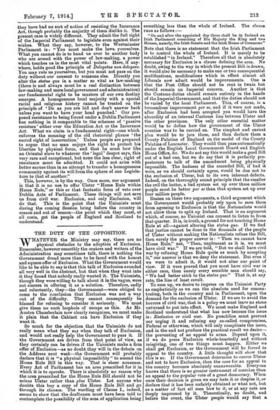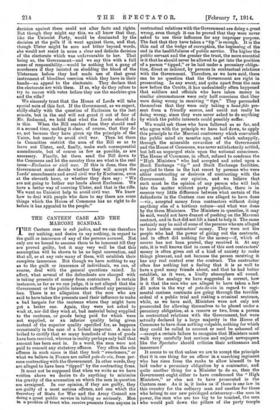THE DUTY OF THE OPPOSITION. '[WHATEVER the Ministry may say,
there are no
physical obstacles to the adoption of Exclusion. Remember, however smoothly the orators and writers of the Administration may sometimes talk, there is nothing the Government dread more than to be faced with the honest and square offer of Exclusion. What the Government would like to be able to say is that this talk of Exclusion eounded all very well in the abstract, but that when they went into it they found that nobody really wanted it. The Unionists, though they were willing to talk about it in the vague, were not sincere in offering it as a solution. Therefore, sadly and reluctantly, they—the Government—were obliged to come to the conclusion that Exclusion was not a way out of the difficulty. They cannot consequently be blamed for refusing to consider it seriously. We must give them no such loophole of escape as this. As Mr. Austen Chamberlain now clearly recognizes, we must make it plain that the Cabinet can have Exclusion if they
want it.
So much for the objection that the Unionists do not really mean what they say when they talk of Exclusion, and would not really help the Government to pass it. If the Government are driven from that point of view, as they certainly can be driven if the Unionists make a firm offer of Exclusion—as no doubt they will in the debate on the Address next week—the Government will probably declare that it is "a physical impossibility" to amend the Home Rule Bill in this way. That is sheer nonsense. Every Act of Parliament has an area prescribed for it in which it is to operate. There is absolutely no reason why the area prescribed for the Home Rule Bill should not he minus Ulster rather than plus Ulster. Let anyone who doubts this buy a copy of the Home Rule Bill and go through its clauses. The wording of Clause L, indeed, seems to show that the draftsmen must have been told to contemplate the possibility of the area of application being
something less than the whole of Ireland. The clause runs as follows :—
" On and after the appointed day there shall be in Ireland an Irish Parliament consisting of His Majesty the King and two Houses, namely, the Irish Senate and the Irish House of Commons."
Note that there is no statement that the Irish Parliament is to control the whole of Ireland. It is merely to be established " in Ireland." Therefore all that is absolutely necessary for Exclusion is a clause defining the area. No doubt, owing to the way in which the present Bill is drawn, it would also be necessary to make one or two consequential modifications, modifications which in effect almost all Liberals now admit would be improvements. One is that the Post Office should not be rent in twain but should remain an Imperial concern. Another is that the Customs-duties should remain entirely in the hands of the Imperial Government, and that the duties should not be varied by the local Parliament. This, of course, is a tremendous improvement per se, and if it were not made, after Exclusion had been accepted you would have the absurdity of an internal Customs line between Ulster and the other provinces. The only other essential matter would be to define bow the government of the Ulster counties was to be carried on. The simplest and easiest plan would be to join them, and then declare them a County Palatine of England on the model of the County Palatine of Lancaster. They would then pass automatically under the English Local Government Board and English Home Office, &c. We do not say this would make a good Bill out of a bad one, but we do say that it is perfectly pre- posterous to talk of the amendment being physically impossible. The badness of the amended Bill, if bad it were, as we should certainly agree, would be due not to the exclusion of Ulster, but to its own inherent defects. Indeed, on the thoroughly sound principle that the smaller the evil the better, a had system set up over three million people must be better per se than that system set up over four million people. Beaten on these two arguments, a third argument which the Government would probably rely upon to save them from agreeing to Exclusion is that the Nationalists would not allow them to split up Ireland. That is an argument which, of course, no Unionist can consent to listen to from that quarter. It is, in truth, a ground for not touching Home Rule at all—against altering the status quo. If wo find that justice cannot be done to the demands of the people of Ulster without making the Nationalists refuse the Bill, then surely the proper answer is : " Then we cannot have Home Rule," not, "Then, unpleasant as it is, we must have civil war." If we are told, "But we shall have civil war by refusing Home Rule quite as much by accepting it," our answer is that we deny the statement. But even if wo were to admit it, it would not alter our point of view. If it were proved that you must have civil war in either case, then surely every sensible man should say, " We had better stick to the status quo." That is, at any rate, the line of least revolt.
To sum up, we desire to impress on the Unionist Party as emphatically as we can the absolute need for concen- trating, both in the country and in Parliament, upon the demand for the exclusion of Ulster. If we are to avoid the horrors of civil war, that is a policy we must leave no stone unturned to put into effect. We must make England and Scotland understand that what has now become the issue is : Exclusion or civil war. No punctilios must prevent our urging it and refusing any so-called compromises, Federal or otherwise, which will only complicate the issue, and in the end not produce the practical result we desire— the preventing of an appeal to arms. Depend upon it, if we do press Exclusion whole-heartedly and without misgiving, one of two things must happen. Either we shall get Exclusion, or the Government will be forced to appeal to the country. A little thought will show that this is so. If the Government determine to coerce Ulster and not to have Exclusion, then the case for an appeal to the country becomes absolutely unanswerable. Everyone knows that there is no greater instrument of coercion than an appeal to the popular vote of a great democracy. When once their decision is given we may hate it or despise it, or declare that it has been unfairly obtained or what not, but as a matter of fact all men bow to it, or at any rate are deeply impressed by it. Theoretically, no doubt, and before the event, the Ulster people would say that a
decision against them could not alter facts and rights. But though they might say this, we all know that they, like the Unionist Party, would be dominated by the decision at the polls if it went against them, and that, though Ulster might be sore and bitter beyond words, she would not resist in arms a clear and definite decision of the electorate which was unfavourable to her. That being so, the Government—and we say this with a full sense of responsibility—would be nothing but a gang of murderers if they insisted on shedding the blood of the Ulstermen before they had made use of that great instrument of bloodless coercion which they have in their hands—an appeal to the electorate. They declare that the electorate are with them. If so, why do they refuse to try to coerce with votes before they use the machine-gun and the rifle ?
We sincerely trust that the House of Lords will take special note of this fact. If the Government, as we expect, shilly-shally with the question of Exclusion to the last minute, but in the end will not grant it out of fear of Mr. Redmond, we hold that what the Lords should do is this. When the Bill reaches them they should read it a second time, making it clear, of course, that they do so, not because they have given up the principle of the Union, but merely to avoid civil war. Then let them in Committee restrict the area of the Bill so as to leave out Ulster, and, finally, make such consequential amendments, but of course as few as possible, as are necessary. Finally, let them send the Bill down to the Commons and let the country thus see what is the real issue—Exclusion or civil war. If this is done, then the Government must decide whether they will accept the Lords' amendments and avoid civil war by E xclusion, even at the eleventh hour, or whether they dare say : "We are not going to bother our heads about Exclusion. We have a better way of coercing Ulster, and that is the rifle. We want no Unionist help to avoid civil war. We know how to deal with people who dare to say there are some things which the House of Commons has no right to do before it has appealed to the people."











































 Previous page
Previous page